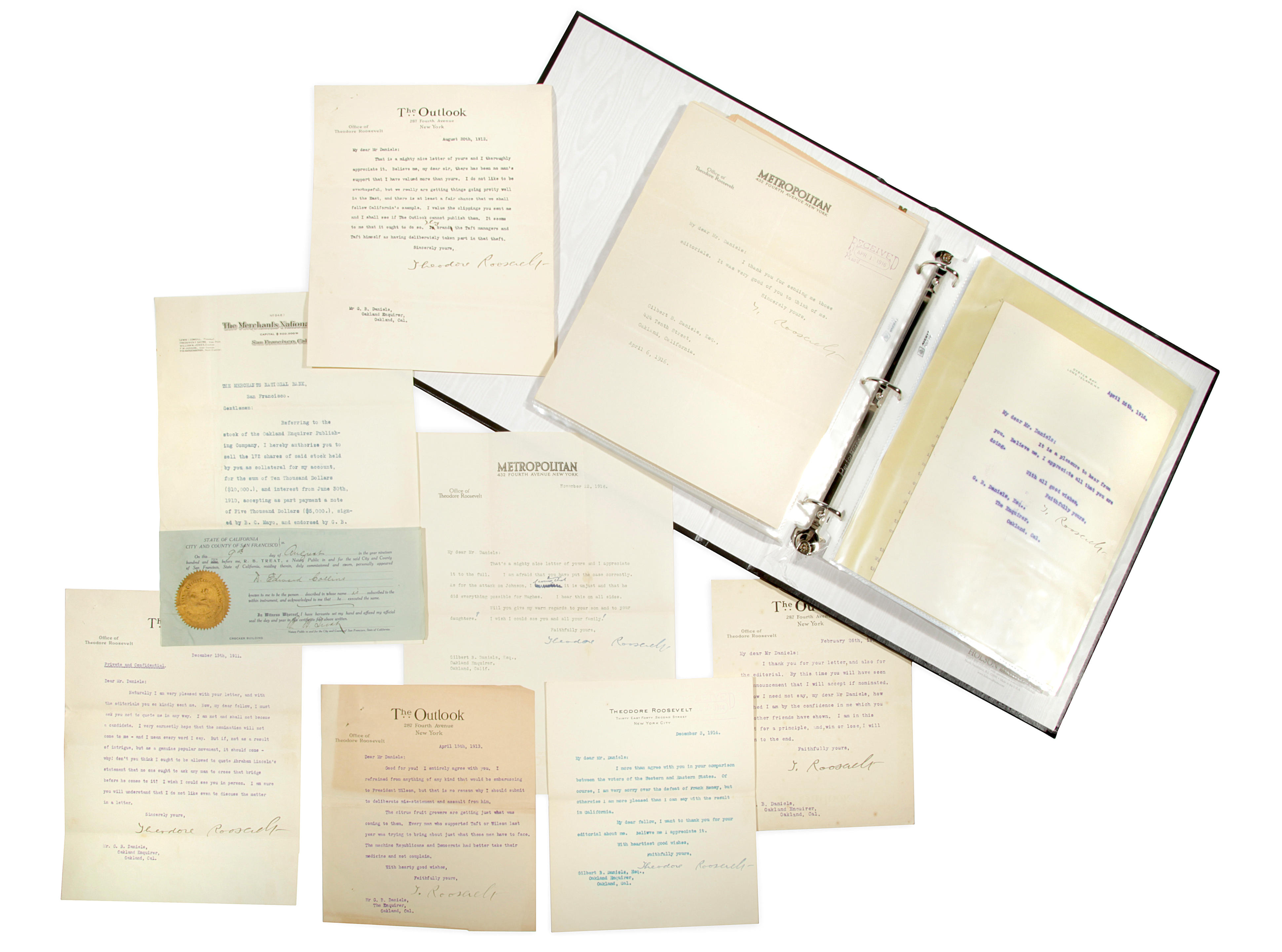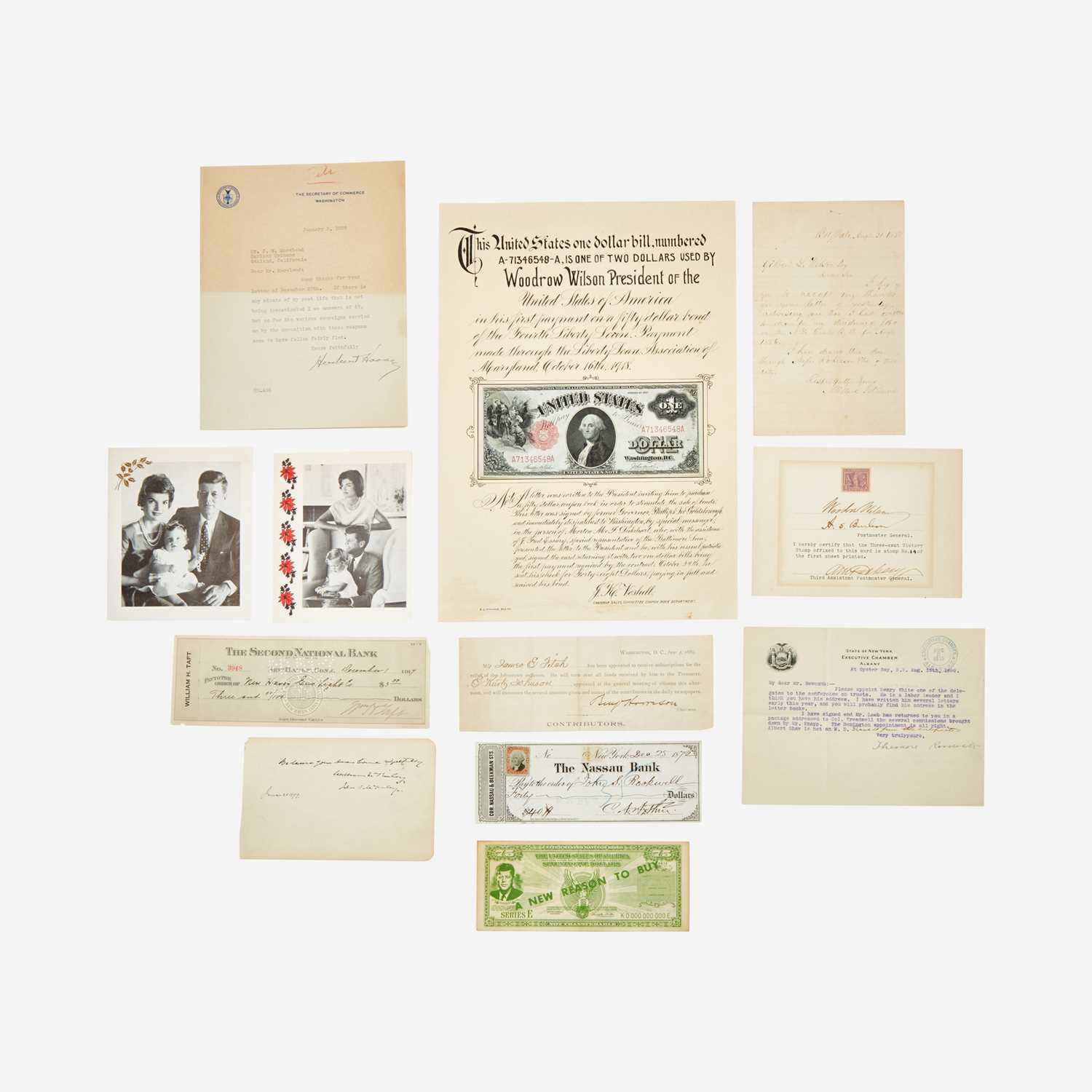ROOSEVELT, Theodore (1858-1919). Typed document signed ("Theodore Roosevelt"), as New York City Police Commissioner, to W.C. Sanger, New York, 5 February 1897. 8 pages, 4tos, on rectos only, Police Department stationery, paper clip traces on top edges. .
ROOSEVELT, Theodore (1858-1919). Typed document signed ("Theodore Roosevelt"), as New York City Police Commissioner, to W.C. Sanger, New York, 5 February 1897. 8 pages, 4tos, on rectos only, Police Department stationery, paper clip traces on top edges. . KEEPING "BLOCKHEADS" OFF THE FORCE: COMMISSIONER ROOSEVELT DEFENDS THE POLICE ENTRANCE EXAM A detailed, often hilarious, eight-page defense of the New York police, in response to a critic who objected to the questions asked recruits in the NYPD's entrance examination. Abraham Gruber objected to "the Reign of Roosevelt" and saw snobbery in the questions that dealt with history, government, and geography. Roosevelt rejects the argument completely: "Mr. Gruber's contention apparently is that questions which it is proper to ask a man before he becomes a citizen are improper when asked him upon his seeking to become the official representative of all citizens and, in a peculiar sense, the guardian of the laws and the upholder of the government...Perhaps," he continues, "by quoting the answers to some of the questions we asked it may be possible to give a clearer idea of the mental development of the candidates who failed. For example: one question we asked was to name five of the States that seceded from the Union in 1861. One answer was 'New York, Albany, Pennsylvania, Philadelphia and Delaware.' Another question was 'Name five of the New England States?' One answer to this question was 'England, Ireland, Scotland, Whales and Cork.' Another was 'London, Africa and New England.'...Another question was 'Upon what written instrument is the government of the United States founded?' The conclusion one bright competitor reached was expressed in the brief word 'Paper.'...Yet another question was 'Into what three branches is the government of the United States divided?' Rather a common answer to this during the heat of the last campaign was 'Democrats, Republicans and Populists'..." Other applicants had Lincoln shot by Garfield, while others said Guiteau, and one even pinned it on Thomas Jefferson "I will ask any thoughtful man," T.R. concludes, "after reading over those answers to questions, whether, on the average, it is not likely that a man of sufficient intelligence and public spirit to know a little about the government and its history is not apt to make a better public employe, especially in the police force, than the blockhead who is incapable of understanding what the words 'government' and 'history' mean...?" The best proof of his methods, Roosevelt argues, "is the way it has worked. We have appointed sixteen hundred patrolmen under these examinations...If they were strong, hardy young fellows of good character and fair intelligence they got their appointments. As a whole, they form the finest body of recruits that have ever been added to the New York police force."
ROOSEVELT, Theodore (1858-1919). Typed document signed ("Theodore Roosevelt"), as New York City Police Commissioner, to W.C. Sanger, New York, 5 February 1897. 8 pages, 4tos, on rectos only, Police Department stationery, paper clip traces on top edges. .
ROOSEVELT, Theodore (1858-1919). Typed document signed ("Theodore Roosevelt"), as New York City Police Commissioner, to W.C. Sanger, New York, 5 February 1897. 8 pages, 4tos, on rectos only, Police Department stationery, paper clip traces on top edges. . KEEPING "BLOCKHEADS" OFF THE FORCE: COMMISSIONER ROOSEVELT DEFENDS THE POLICE ENTRANCE EXAM A detailed, often hilarious, eight-page defense of the New York police, in response to a critic who objected to the questions asked recruits in the NYPD's entrance examination. Abraham Gruber objected to "the Reign of Roosevelt" and saw snobbery in the questions that dealt with history, government, and geography. Roosevelt rejects the argument completely: "Mr. Gruber's contention apparently is that questions which it is proper to ask a man before he becomes a citizen are improper when asked him upon his seeking to become the official representative of all citizens and, in a peculiar sense, the guardian of the laws and the upholder of the government...Perhaps," he continues, "by quoting the answers to some of the questions we asked it may be possible to give a clearer idea of the mental development of the candidates who failed. For example: one question we asked was to name five of the States that seceded from the Union in 1861. One answer was 'New York, Albany, Pennsylvania, Philadelphia and Delaware.' Another question was 'Name five of the New England States?' One answer to this question was 'England, Ireland, Scotland, Whales and Cork.' Another was 'London, Africa and New England.'...Another question was 'Upon what written instrument is the government of the United States founded?' The conclusion one bright competitor reached was expressed in the brief word 'Paper.'...Yet another question was 'Into what three branches is the government of the United States divided?' Rather a common answer to this during the heat of the last campaign was 'Democrats, Republicans and Populists'..." Other applicants had Lincoln shot by Garfield, while others said Guiteau, and one even pinned it on Thomas Jefferson "I will ask any thoughtful man," T.R. concludes, "after reading over those answers to questions, whether, on the average, it is not likely that a man of sufficient intelligence and public spirit to know a little about the government and its history is not apt to make a better public employe, especially in the police force, than the blockhead who is incapable of understanding what the words 'government' and 'history' mean...?" The best proof of his methods, Roosevelt argues, "is the way it has worked. We have appointed sixteen hundred patrolmen under these examinations...If they were strong, hardy young fellows of good character and fair intelligence they got their appointments. As a whole, they form the finest body of recruits that have ever been added to the New York police force."















Testen Sie LotSearch und seine Premium-Features 7 Tage - ohne Kosten!
Lassen Sie sich automatisch über neue Objekte in kommenden Auktionen benachrichtigen.
Suchauftrag anlegen